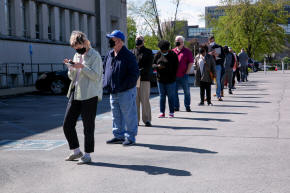U.S. weekly jobless near five-month high; labor market still very tight
 Send a link to a friend
Send a link to a friend
 [June 10, 2022] By
Lucia Mutikani [June 10, 2022] By
Lucia Mutikani
WASHINGTON (Reuters) - The number of
Americans filing new claims for unemployment benefits increased to the
highest level in nearly five months last week, but that likely does not
mark a material shift in labor market conditions, which remain extremely
tight.
The report from the Labor Department on Thursday also showed
unemployment rolls remained at a more than 52-year low at the end of
May, underscoring the jobs market's strength.
Amid reports of companies freezing hiring or contemplating layoffs in
anticipation of a recession next year, the weekly jobless claims data is
being closely watched. Overall demand for labor, however, remains
strong, with 11.4 million job openings at the end of April. Economists
largely shrugged off last week's larger than expected rise in claims as
noise.
"Widespread difficulties in hiring workers are still discouraging
businesses from laying off workers, but pockets of weakness have emerged
among some tech startups as well as retailers which have felt the impact
from a shift in consumer spending from goods to services," said Dante
DeAntonio, a senior economist at Moody's Analytics in West Chester,
Pennsylvania.

Initial claims for state unemployment benefits rose 27,000 to a
seasonally adjusted 229,000 for the week ended June 4, the highest since
mid-January. Economists polled by Reuters had forecast 210,000
applications for the latest week.
The data included the Memorial Day holiday. The seasonal factors, the
model that the government uses to strip out seasonal fluctuations from
the data, had expected a 21,362 drop in unadjusted claims, as hiring
typically increases in summer. But with worker shortages rampant, there
is limited room for big decreases and unadjusted claims are already at
very low levels.
Unadjusted claims edged up 1,008 to 184,604 last week. There were
notable increases in applications in Florida, Georgia and Pennsylvania,
which offset declines in Mississippi and Michigan.
"This means that the recent increases in the seasonally adjusted data
have occurred because the underlying level of filings has not moved down
by as much as the seasonal factors anticipated, but not because of an
actual increase in the real-world level of filings," said Daniel Silver,
an economist at JPMorgan in New York.

[to top of second column] |

People line up outside a newly reopened career center for in-person
appointments in Louisville, U.S., April 15, 2021. REUTERS/Amira
Karaoud

"We also should keep in mind that the data can be noisy from week to week and
particularly noisy around holidays like Memorial Day."
Stocks on Wall Street were lower. The dollar rose against a basket of
currencies. U.S. Treasury prices fell.
STUCK IN A TIGHT RANGE
Claims have been locked in a tight range since plunging to a more than a 53-year
low of 166,000 in March. They have tumbled from a record high of 6.137 million
in April 2020.
"Jobless claims are unlikely to move very much from current levels without some
loosening in labor markets," said Isfar Munir, an economist at Citigroup in New
York. "A return to more normal labor market conditions would, ironically, be
accompanied by a rise in jobless claims."
The Federal Reserve, seeking to cool demand for labor without raising the
unemployment rate too high to defeat inflation, is poised to deliver another 50
basis points interest rate hike next Wednesday. The U.S. central bank is
expected to raise its policy interest rate by an additional half a percentage
point in July. The Fed has hiked the overnight rate by 75 basis points since
March.
The government reported last Friday that nonfarm payrolls increased by 390,000
jobs in May, with the unemployment rate holding steady at 3.6% for a third
straight month. Economists expect the jobless rate to decline in the coming
months.
The claims report showed the number of people receiving benefits after an
initial week of aid was unchanged at 1.306 million during the week ending May
28. The so-called continuing claims are at levels last seen at the end of 1969.
The insured unemployment rate held at a record low 0.9% at the end of May.

"The insured unemployment rate suggests that the official unemployment rate will
drop further, potentially closer to 3%," said Moody's Analytics' DeAntonio. "Job
growth needs to cool to help the Fed pull off a soft landing."
(Reporting by Lucia Mutikani; Editing by Chizu Nomiyama)
[© 2022 Thomson Reuters. All rights
reserved.]This material may not be published,
broadcast, rewritten or redistributed.
Thompson Reuters is solely responsible for this content. |